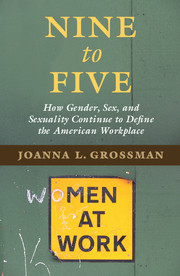Book contents
- Frontmatter
- Dedication
- Contents
- Foreword
- Acknowledgments
- Introduction
- PART I WHAT IS SEX DISCRIMINATION?
- PART II SEXUAL HARASSMENT
- 12 Workplace Affairs and Sexual Favoritism
- 13 Lolita at the Office
- 14 Sex Talk in the Writers’ Room
- 15 Sex Behind Bars
- 16 When the Supervisor Bullies Only Women
- 17 The Equal Opportunity Harasser
- 18 Periodontal Perils
- 19 Punishing Effeminacy
- 20 Late-Night Affairs with David Letterman
- 21 Why Herman Cain Has Not Been Able to Talk His Way Out of His Exploding Sexual Harassment Scandal
- 22 Why Hostile Environment Harassment Is a “Continuing Violation”
- 23 When Sexual Extortion Is Successful
- 24 The Consequences of Failing to Complain about Harassment
- 25 Who Is Responsible for Sudden, Severe Harassment?
- 26 Chinks in the Harassment Law Armor
- 27 Do Employer Efforts Prevent Harassment or Just Prevent Liability?
- 28 Who's the Boss?
- 29 Costly Mistakes
- 30 Hands Off the Merchandise
- PART III PREGNANT WOMEN AND MOTHERS AT WORK
- PART IV FEMALE BREADWINNERS AND THE GLASS CEILING
- Conclusion
- Notes
- Index
14 - Sex Talk in the Writers’ Room
from PART II - SEXUAL HARASSMENT
Published online by Cambridge University Press: 05 May 2016
- Frontmatter
- Dedication
- Contents
- Foreword
- Acknowledgments
- Introduction
- PART I WHAT IS SEX DISCRIMINATION?
- PART II SEXUAL HARASSMENT
- 12 Workplace Affairs and Sexual Favoritism
- 13 Lolita at the Office
- 14 Sex Talk in the Writers’ Room
- 15 Sex Behind Bars
- 16 When the Supervisor Bullies Only Women
- 17 The Equal Opportunity Harasser
- 18 Periodontal Perils
- 19 Punishing Effeminacy
- 20 Late-Night Affairs with David Letterman
- 21 Why Herman Cain Has Not Been Able to Talk His Way Out of His Exploding Sexual Harassment Scandal
- 22 Why Hostile Environment Harassment Is a “Continuing Violation”
- 23 When Sexual Extortion Is Successful
- 24 The Consequences of Failing to Complain about Harassment
- 25 Who Is Responsible for Sudden, Severe Harassment?
- 26 Chinks in the Harassment Law Armor
- 27 Do Employer Efforts Prevent Harassment or Just Prevent Liability?
- 28 Who's the Boss?
- 29 Costly Mistakes
- 30 Hands Off the Merchandise
- PART III PREGNANT WOMEN AND MOTHERS AT WORK
- PART IV FEMALE BREADWINNERS AND THE GLASS CEILING
- Conclusion
- Notes
- Index
Summary
The long-running comedy series “Friends” went off the air in 2004, but lived on not only through syndication but also through litigation.
The case, Lyle v. Warner Brothers Television Productions, pitted a writer's assistant against the show's writers – who, she claimed, engaged in a course of illegal sexual harassment. The California Supreme Court ruled 7-0 in favor of the sitcom writers. Crucially, however, the court did not insulate “creative workplaces” from harassment claims in general, as the defendants had argued it should.
THE LAWSUIT: WAS THE WRITERS’ ROOM A “HOSTILE ENVIRONMENT”?
Amaani Lyle, an African-American woman, was hired as a “writer's assistant” for “Friends” in 1999. Her primary task in that position was to sit in on creative meetings and take detailed notes for the writers when they were plotting out potential story lines. Being a fast typist was her main qualification for the job.
For four months, Lyle worked primarily for Adam Chase and Gregory Malins, two of the show's writers, and a supervising producer, Andrew Reich. She was then fired, allegedly because she did not type fast enough to keep up with the creative discussions. As a result, the defendants argued, important jokes and dialogue were missing from her notes.
After being fired, Lyle sued in California state court, bringing claims under California's anti-discrimination law. She alleged that she had been subjected to a variety of illegal actions: race discrimination, sexual harassment, retaliation, and wrongful termination. (As we saw in Chapter 12, California's law with respect to these actions is similar, but not identical, to federal anti-discrimination law.)
The trial court granted the defendants summary judgment on all counts, ordered her to pay costs, and, quite surprisingly, ordered her to pay the defendants’ whopping legal fees (amounting to $415,800), on the theory that her anti-discrimination claims were frivolous and without foundation. (Civil rights plaintiffs who prevail are often awarded attorneys’ fees as part of the judgment; but they are almost never required to pay the other side's fees if they lose.)
Lyle appealed both the dismissal of her claims and the award of attorneys’ fees. The appellate court reversed the fee award, and resurrected one of her claims for trial: sexual harassment.
- Type
- Chapter
- Information
- Nine to FiveHow Gender, Sex, and Sexuality Continue to Define the American Workplace, pp. 88 - 95Publisher: Cambridge University PressPrint publication year: 2016



